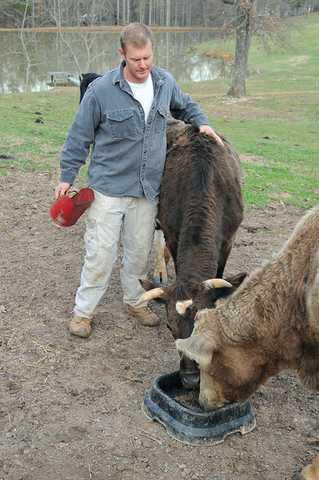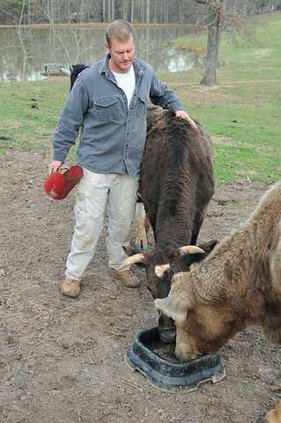A Maysville farmer says he's doing just fine three weeks after a 900-pound rabid cow attacked him on his farm.
Raymond Parks said the cow, one of a few dozen he raises, attacked him without provocation. The cow head-butted him, giving the 71-year-old a gash on his head and breaking a few ribs.
During the attack, Parks said he crawled to his truck to grab a shotgun.
"I took three shots on her point blank," he said.
Instead of halting the cow, he said the animal stayed on its feet until it ran into a fence post, knocking itself out.
Later, a veterinarian put the cow down and confirmed it had rabies.
"I reckon it just makes it goes crazy," Parks said.
Because of the risk of rabies exposure, Parks told The Times he has had to get a series of rabies shots. His last comes today.
Since WXIA-TV broke the story this week, Parks said he has also fielded calls from media outlets as far away as New York and California.
"I got a call from CBS in New York," he said. "They asked me to call back but I didn't."
Parks said a veterinarian told him the cow may contracted rabies from a coyote about six months ago when it gave birth to a calf.
Parks said some of his other cows would have to be quarantined to ensure they also did not have the disease.
In 40-some years of raising cows, Parks said he'd never heard of them contracting rabies.
His Jackson County farm is not far from the spot where a rabid bobcat was recently discovered in Gillsville.
Kathy Cooper, whose family raises cattle in Chestnut Mountain, said she's never heard of a rabid cow before.
"We've never had a situation like that," said Cooper, whose cattle get vaccinated for multiple diseases but not rabies. "I don't even know if they have a vaccination for cows."
Michael Wheeler, University of Georgia Cooperative Extension coordinator for Hall County, said cattle don't contract rabies often, but it's not unheard of.
Mike Ledford, director of Hall County Animal Control, said there has never been a confirmed case of rabies in a cow in Hall County. Still, he said, cattle owners can be prepared.
"The state recommends that cows be vaccinated (for rabies) but does not require it," he wrote in an email to The Times.
Wheeler said those shots, while not generally part of vaccination protocol for livestock, could be worth the expense.
"Rabies vaccines are cheap relative to the return on their investment," he said.
This case follows other rabies cases reported in Northeast Georgia this winter.
Four confirmed cases of rabies have occurred in Hall County so far in 2012.
Two of those were announced Friday after a skunk in North Hall and a raccoon in East Hall returned positive tests by the Georgia Public Health Lab in Decatur this week.
The raccoon came in contact with several dogs in the Cedar Creek Road area. The skunk came into contact with two dogs near Indian Oak Point.
Residents who live in those areas are asked to report abnormal animal activity to Hall County Animal Control at 770-531-6830 or during nonworking hours call Hall County Dispatch at 770-536-8812.
David Jones, an officer for Hall County Animal Control, told The Times this week that unusually warm temperatures could be to blame for an influx of rabies cases.
He said sustained warm weather alters animals' normal hibernation habits. If winter conditions don't return to the area, Jones said the county could see an above average year for cases.

